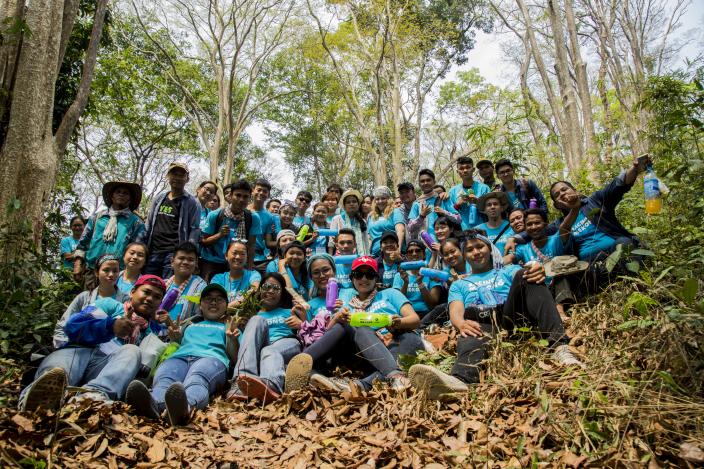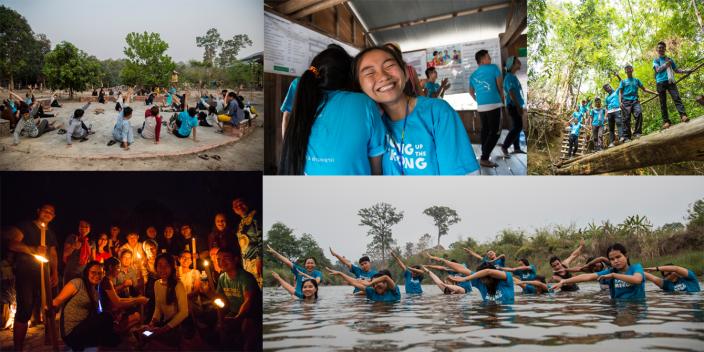“Racing up the Mekong for Humanity and Nature”, a regional youth camp organized by Oxfam and partner Save Cambodia Wildlife (SCW) for 25 young men and women from the Mekong countries to share ideas and exchange learning about the interconnection between people and river systems and identify young people’s roles in addressing current and future challenges on water governance and natural resource management. The camp took place from 25-29 March 2018 in “Mondul Yorn” an ecotourism site on a tributary of the Sesan River and the buffer of Vireak Chey National Park, Ratanakiri province, Cambodia.
“Oxfam received overwhelming interest from young people across the Mekong region to join this camp. Among 260 applicants from Vietnam, Lao, Cambodia, Myanmar and Thailand, we selected 25 outstanding participants who represent young people across a range of diverse fields such as environmental activists, dam campaigners and university students who have a very strong interest in environmental protection,” said Socheata Sim, Oxfam Regional Water Governance Project Manager.
Participants Reflection
“This is an amazing trip for youth from the Mekong region,” said Truong Hong Suong, a young woman from the Mekong Delta in Vietnam. “ All of us mostly live in the big cities and we have never experienced and learned much about wildlife, nature and the way local people in remote areas live. This opportunity lets us experience their lives, understand more about the value of natural resources and we have more emotional connection to protect natural resources.”
There are a lot of things to learn from this camp for Suong, especially the culture of indigenous Broa. It is very unique and the villagers pray for peace and happiness for everybody with the indigenous jar-wine (local Whisky) and it was very special for her. “When they go to the river and forest, they always pray. If the natural resources are gone so their culture will be gone too,” said Suong.
After the 10-hour trip in the van, and 2-hour boat trip on O’Tabok tributary of the Sesan River, it was a very long ride for Min Chenda, a Cambodian youth who is living with the disability of partial sight but she did not feel exhausted.
“I am very happy. I smelled the best forest flowers, wind and cool water of the tributary of the Sesan River,” Chenda said.
“For me, to maintain the sustainability of the forest and river, we all have to increase our love of nature and learn the advantages of keeping the forest. If we don’t understand the benefits of nature and river resources we will destroy them.”
Teng Muengmanphakdy, a young university student from Laos is passionate about environmental protection and said it was a good opportunity for a young citizen like him to be together with other young people from the region to learn about environmental aspects and how to tackle the common issues of the Mekong together.
“I learned about how to preserve and protect the environment. The camp fire was a very new experience for me. When I return home, I will make a plan to have workshops or events that I can share with my local communities and students at my university about the importance of protecting the environment, water governance and natural resource management I learned from the camp,” said Teng.
Thanakrit Thongfa, a 25-year old young indigenous Karen campaigner from Thailand, said it is very important for young people to work and take action together to protect their community’s natural resources from any big development projects in the Mekong such as hydropower and mining.
“I will use the skills I learned from this camp to support my community to protect our river because my community also has a problem caused by mining companies. We also have a youth group that I will share these knowledge and skills with them too,” said Thanakrit.
It was such an amazing experiences for Set Kaung San from Myanmar to live in a completely different environment from where he lives in the big city like Yangon.
“I had a chance to learn a lot about the problems that the Mekong is facing and what we can do to save the Mekong. I also realized the importance of water and how we should think about "Generational Justice" for the future generations and how important it is for us,” he said.
Kaung San said he made lots of amazing friends and realized that despite their differences, there are lots of common things in each and every part of the Mekong. He feels the power of youth who are willing to create a more beautiful and brighter future for the next generation by conserving the environment and enabling them to see the beauty of the Mekong River.
“I can imagine how powerful the combined forces of youth from the Mekong Region would be,” said Set Kaung San.
Tim Nith, 59 indigenous Broa, a fisherman and farmer living at Modul Yorn said: “I am very happy to see young people from different countries in the Mekong region visiting my village and learning about our culture, our river and forest and how we as indigenous people conserve and protect our forest.”
These young people came up with very strong initiatives to share their learning, help protect the environment at the local level, from keeping the communities clean from rubbish littering to sharing their key learning with fellow university students and by raising awareness using social media. This kind of locally-youth-led initiatives are vital and Oxfam will continue to support the leadership of youth to make changes at their local level and provide platforms where they can connect with young women and men at national and regional youth networks.

Photo: Savann Oeum/Oxfam
“I am very happy. I smelled the best forest flowers, wind and cool water of the tributary of the River.”
